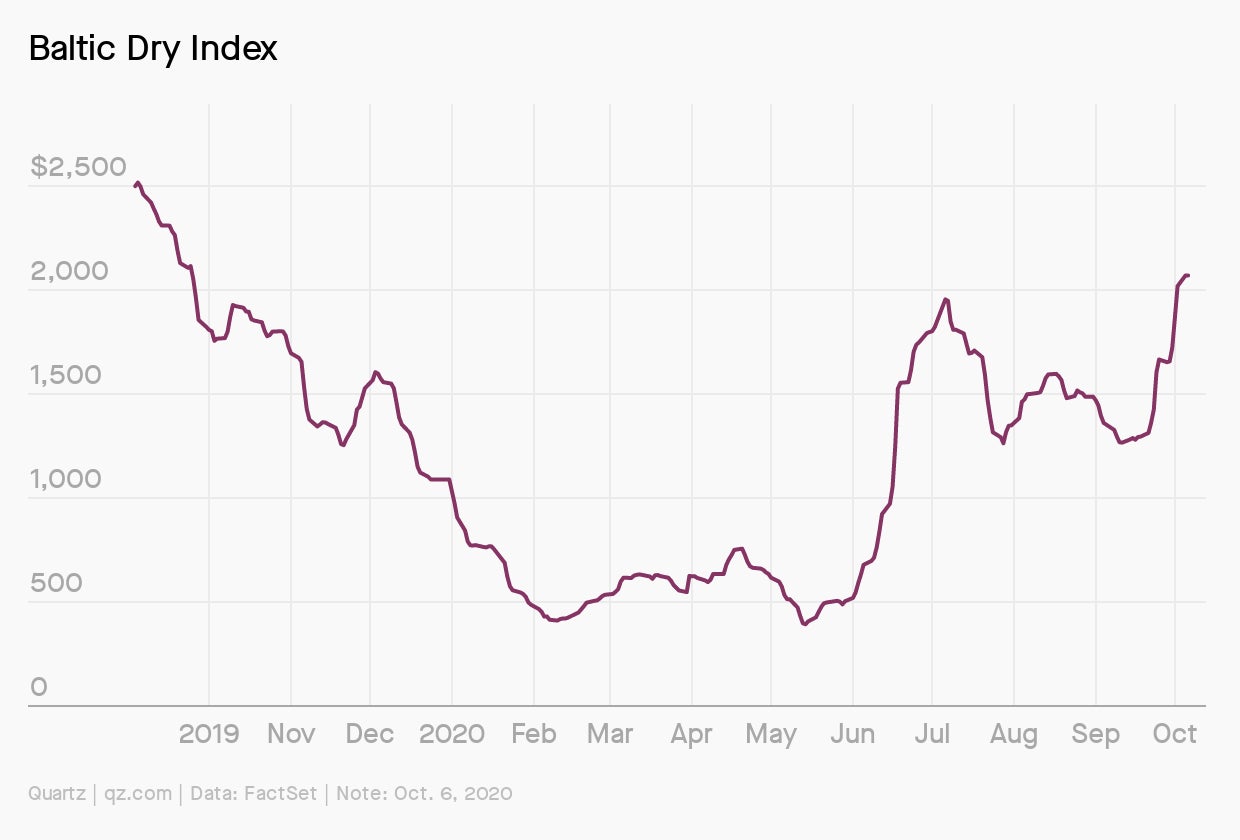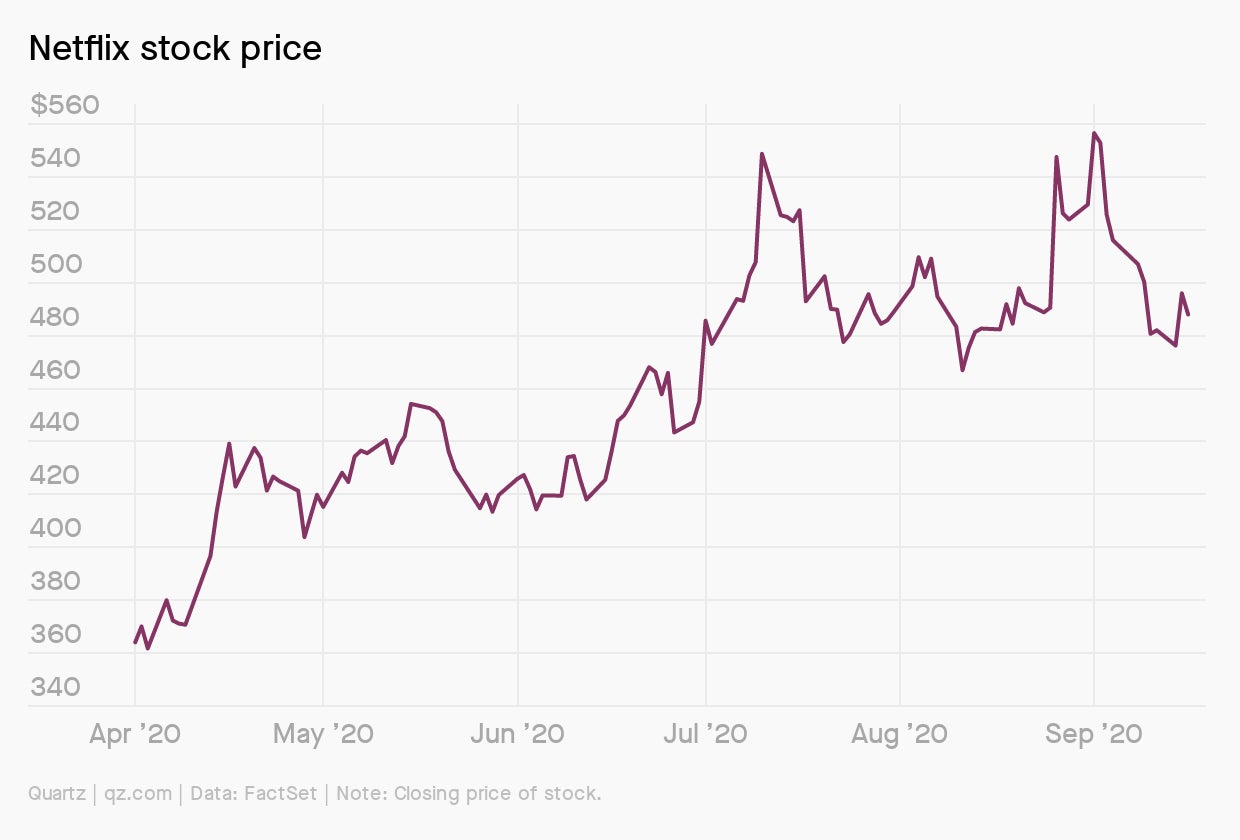Pence vs. Harris vs. fly, Nagorno-Karabakh talks, Slack sneakers
Good morning, Quartz readers!

Good morning, Quartz readers!
Here’s what you need to know
Mike Pence faced off against Kamala Harris. The US vice president and his Democratic rival sparred far more politely than last week’s presidential debate, even as Pence defended against Harris’s condemnation of White House failures on the pandemic, the economy, and climate change. Nevertheless, a humble fly managed to steal the show. Separately, president Donald Trump called his coronavirus infection “a blessing from God” and touted experimental Covid-19 drug treatments as “cures.”
France, the US, and Russia hold talks on Nagorno-Karabakh. They are meeting in Geneva to redouble efforts to negotiate a ceasefire between Azerbaijan and Armenia over the disputed territory. Over 360 people have been killed in the fighting that started on Sept. 27, and there are growing fears it could become a regional war.
A UK parliamentary inquiry alleged collusion between Huawei and the CCP. The report by the defence committee said there is “clear evidence” of strong links between the Chinese telecoms giant and China’s ruling party, and that the government may need to ban the firm’s 5G equipment from UK networks earlier than the current deadline. Meanwhile, the UK and Ukraine will sign a partnership agreement that includes a free trade deal.
The US warned China against a Taiwan invasion. National security advisor Robert O’Brien said that while Beijing is aggressively expanding its naval capacity, an amphibious landing on the island nation would still be “notoriously difficult,” and reiterated the US policy of “strategic ambiguity,” which leaves Beijing guessing on what moves the US would make to protect Taiwan.
The Nobel literature prize is awarded. Speculation is rife as to who will be named this year’s laureate. Last year’s choice of Austrian novelist Peter Handke attracted criticism because of the writer’s support for former Serbian leader Slobodan Milošević, notorious for committing war crimes.
Charting the Baltic Dry Index
If you’re not one to keep an eye on the BDI, now’s a good time to give a little attention to this number, which tracks the cost of shipping commodities like iron and coal. Right now, the index is the best illustration of how China is pouring cash into infrastructure, from green energy projects to electrical grids and airports, in an array of stimulus measures that are rippling through global financial markets.

China, of course, has been here before. John Detrixhe breaks down why the country’s spending spree matters.
The joy of indexing
From the number of hours people are working in different countries to changing company stock prices, it’s often necessary to compare numbers on very different scales. The key to doing this well is indexing. When data points are indexed, they are all compared to their level at some particular point time.
Consider stock market investing. Let’s say a friend, bored during the Covid-19 lockdown, decided to start buying stocks through mobile banking app Robinhood, figuring it would make for a fun way to kill time and learn a bit more about the stock market. One of the stocks he bought was Netflix. By mid-September he was quite pleased with himself. Since the beginning of April, when he purchased his shares, the stock price had jumped by 34% to $488, from $364.

How would you truly determine whether he made a good bet? As part of our guide to the data deluge, we wrote an explanation of why indexing is so essential and how you can do it yourself.
✦ We’ve checked the data, and it seems like a Quartz membership could be a good thing for you. Check it out.
Obsession Interlude: Because China
Not that long ago, it used to be pretty common to see overwhelmingly male names explaining developments in China in English-language articles. But a number of efforts have made the work of all sorts of women who focus on China—including political scientists, novelists, and scientists—more visible. Here are a few whose work and lives bridge cultures:
Yangyang Cheng, a particle physicist, writes deeply personal essays on being a US immigrant, her relationship with her mother in China, and her attempts to navigate the vast gulf between the value systems of both countries, often drawing on her scientific background.
Courtney Fung, an assistant professor of international relations at the University of Hong Kong, is an expert on China’s influence in global governance. Count on her to point out, for example, instances of Beijing using international organizations to marginalize Taiwan.
Yan Ge became well known in China after winning awards at an American Idol-style writing competition. Now living in Ireland, Yan has shifted to writing in English—a switch that she says makes your personality “undergo a slight, or probably profound, change.”
Chencheng Zhang, who teaches politics and international relations at Queen’s University Belfast, is fascinated by questions of citizenship, migration, and borders. In this essay, she dissects the rise of the phrase baizuo, or “white left,” on China’s internet.
We’re watching for small changes in China that will have outsize effects elsewhere. Stay up to date with our Because China obsession.
We’re obsessed with comic cons

All dressed up with nowhere to go. If the whole point of what are essentially days-long $300 glorified infomercials is seeing celebs, superheroes, and Cylons in the flesh, is a comic convention still a comic convention if no one shows up? With Star Wars sitting out of all of the online versions, Marvel taking over this week’s New York Comic-Con, and DC Comics hosting its own 24-hour online fan event, there’s no guarantee that these events—at least the ones that fans, vendors, and marketers would recognize—will win out over the villain that is Covid-19. Suit up. The Quartz Weekly Obsession has an industry to save.
You asked about plexiglass
Is plexiglass actually effective in stopping the spread of Covid-19?
The clear barriers are a common sight at many in-person transaction sites these days, including a US vice presidential debate. The partitions principally work by intercepting droplets emitted from someone’s mouth that might contain the virus. They’re also effective at “re-enforcing physical distancing requirements, even when users are unwilling or forgetful” according to Canada’s National Collaborating Centre for Environmental Health.
But physical barriers have their limitations, particularly within, say, a large empty arena in which two politicians are debating. The biggest is that the plexiglass panels could limit ventilation, reducing the air change rate in a given space. Alex Ossola breaks down some knowledge barriers.
Surprising discoveries
Remote work is now an aesthetic. Cole Haan teamed up with Slack for a limited-edition sneaker collection that must have sounded good on paper.
Tasmanian devils are back in mainland Australia. The carnivorous marsupials were reintroduced to forests for the first time in 3,000 years in what researchers called a “soft launch.”
A stolen poetry scroll written by Mao Zedong was found chopped in half. The $300 million artefact went missing last month, and was cut down the middle because someone deemed it too unwieldy.
The UK’s passport photo checker is biased against dark-skinned women. A BBC investigation found that they were more likely to be asked to re-submit a photo than light-skinned applicants.
Letters deciphered in the 17th century were sold for £29,000 ($37,000). The 53 letters were decrypted by a young English chaplain, who went on to become a leading cryptographer.
Our best wishes for a productive day. Please send any news, comments, stolen poetry, and decoded missives to [email protected]. Get the most out of Quartz by downloading our iOS app and becoming a member. Today’s Daily Brief was brought to you by Tripti Lahiri, Mary Hui, Susan Howson, and Max Lockie.